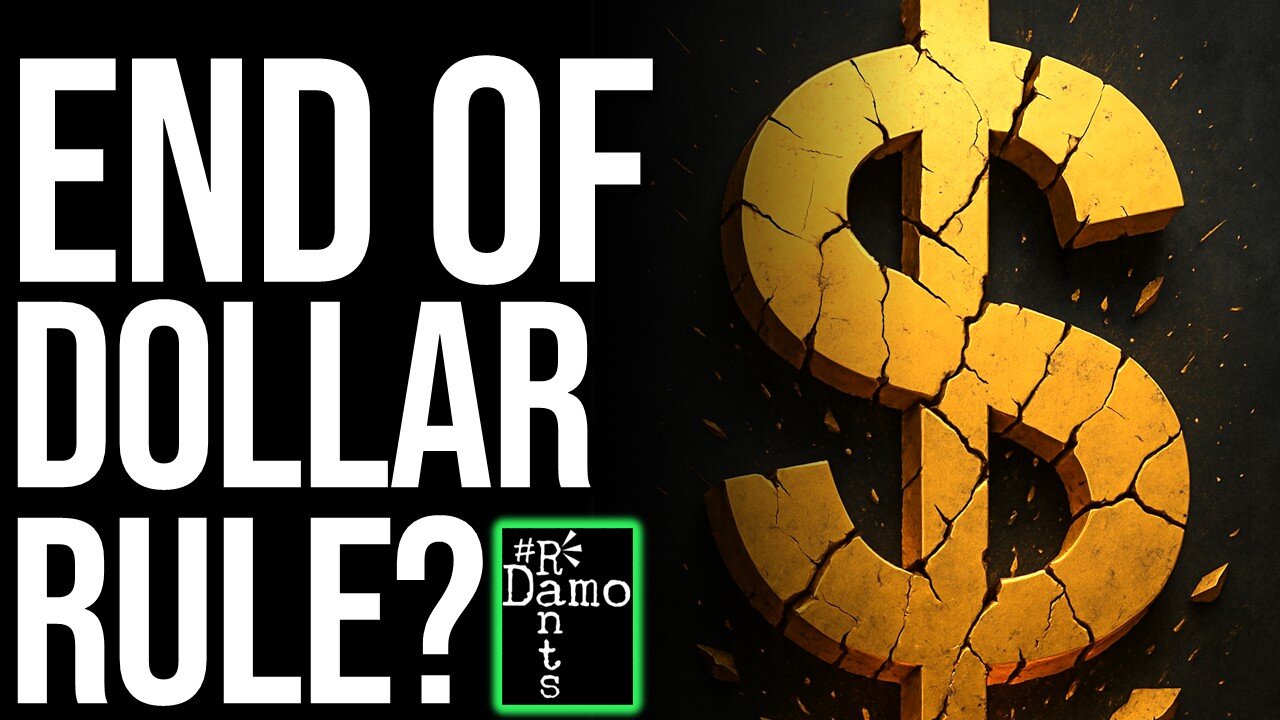Premium Only Content

BRICS Is Building a Financial Nuke — And Iran Has Lit the Fuse
Right, so for years, U.S. sanctions were the stick America could always count on: cut Iran off from dollars, choke its oil exports, and watch its economy wither. But after Israel’s reckless strike on Iranian nuclear sites and Washington’s ritual threats of “snapback,” Tehran has got sick of this and has been looking at a way around it. Iranian President Masoud Pezeshkian didn’t plead for mercy — he went to the BRICS summit instead and proposed something to render those US sanction threats toothless. “Illegal unilateral sanctions” would no longer bite, he argued, if BRICS built the mechanisms to trade, lend, and insure around them. In other words, the siege of sanctions would lose its bite. If his vision takes root, sanctions won’t be instruments of power at all anymore, but relics of decline — blunted and bypassed, and another Western failure at Iran’s hands.
Right, so a few days ago, Iranian President Masoud Pezeshkian spoke by video link to a virtual BRICS summit. His message to them was clear and confrontational: unilateral sanctions imposed by the United States and its allies were not only unjust but corrosive to the very idea of international cooperation, and BRICS must take action against this. “BRICS can develop a joint mechanism to support its members in the face of illegal unilateral sanctions and to continue developing their economies without being subjected to unfair political pressure,” he declared. It was not a plea for sympathy but a demand for structural change. Pezeshkian proposed nothing less than a collective sanctions-shield: a set of institutions, tools, and principles that could blunt the economic chokehold of Western powers.
And of course all of this comes off the back of just months earlier, Israeli jets, and indeed those of the United States itself, had struck Iranian nuclear sites. In the wake of the attacks, Western officials revived threats of renewed sanctions, including the dreaded “snapback” mechanism linked to the Joint Comprehensive Plan of Action (JCPOA). Iran once again faced the prospect of suffocation through financial warfare. Against this backdrop, Pezeshkian’s proposal iss both an act of defiance and a bid for economic survival. But it was also a statement of intent: Iran would not endure sanctions passively anymore, but would seek to delegitimise them, build alternatives, and transform its pain into leadership within the Global South.
Iran has lived under the shadow of sanctions for over four decades. From the time of the 1979 coup to the present, because the West lost control of Iran, the Shah was their patsy. American governments have wielded economic restrictions as their weapon of choice since. Over time, these sanctions metastasised into an all-encompassing regime targeting banking, oil, insurance, and investment. The goal, dressed up in the language of non-proliferation and human rights, was always the same though: to weaken Iran’s economy to the point of political submission. Yet the effect was collective punishment. Essential medicines became scarce, inflation reached punishing levels, and ordinary Iranians saw their livelihoods evaporate. It is why Iran has had to become so self sufficient since and successfully so. It’s nuclear research for one eliciting major breakthrough’s n nuclear medicine, new treatments for cancer for example, this is functionally the sort of thing Israel and the US bombed in June.
The JCPOA of 2015 offered a brief respite though. In return for curbs on uranium enrichment and unprecedented inspections, Iran was promised reintegration into the global economy. But the deal was sabotaged. In 2018, the Trump administration unilaterally withdrew and reinstated sanctions. The “snapback” mechanism written into Resolution 2231 of the UN Security Council became a permanent threat, invoked by Western diplomats whenever Iran sought to assert its rights. Even European attempts to preserve the deal collapsed under American pressure. INSTEX, the mechanism designed by Europe to enable humanitarian trade with Iran, proved to be just another hollow shell as another example, processing almost no transactions. Iran was left isolated once more, its compliance meaningless in the face of US intransigence.
Then came the events of June 2025. Israel’s unprovoked strike on Iranian nuclear facilities, conducted with US support, escalated tensions to a breaking point. Western officials immediately paired the attack with threats of renewed sanctions. The message was unmistakable: Iran would be attacked militarily and strangled economically, and international law would offer no protection. For Pezeshkian, this was the final proof that sanctions were not diplomatic instruments but weapons of war. His September proposal to BRICS must be read in this context: an Iran battered but unbowed, seeking not pity but allies in dismantling a system that had held it hostage for decades.
Until recently, Iran survived sanctions through improvisation. Oil was shipped clandestinely, payments routed through complex networks of shell companies, and barter arrangements struck with sympathetic states. These measures provided breathing room, but they were fragile, costly, and humiliating. Pezeshkian’s approach marks a departure from that. He is no longer content with survival in the shadows. Instead, he seeks institutional resistance — a framework that would allow Iran and other sanctioned states to trade, invest, and develop openly, without the constant fear of financial strangulation, because this new system would nullify it.
In his summit remarks, Pezeshkian placed sanctions within a wider moral and political framework: “Unilateral measures, the instrumental use of sanctions and economic restrictions are among the biggest threats to global justice and stability. These policies not only jeopardize the national interests of independent countries but also disrupt international cooperation and hinder sustainable development.” This was more than rhetoric. By casting sanctions as a global threat, Pezeshkian sought to transform Iran’s suffering into a universal cause.
He also tied the issue to institutional reform. He insisted that “Rebuilding the current world order requires serious reforms in global governance, from revising the composition and functions of the UN Security Council to restructuring the international financial and monetary system.” In other words, sanctions resistance was not just about protecting Iran. It was part of a project to democratise global governance, reduce Western dominance, and strengthen the sovereignty Global South nations, levelling the playing somewhat you might say. In other words what happens to Iran today could happen to any independent country tomorrow, and only collective resistance can provide safety.
This move from defensive endurance to offensive institution-building is strategic. It allows Iran to portray itself as a leader, not a victim. It also turns the tables: rather than constantly pleading for sanctions relief, Iran demands structural change instead. The effect is to challenge the legitimacy of sanctions at their root. If Pezeshkian succeeds, sanctions will no longer appear as neutral instruments of international order, but as relics of coercion destined to collapse.
The credibility of Iran’s proposal depends on the response of other BRICS nations of course, so what have they said about this idea? Here, the picture is both encouraging and complicated. Brazil’s President Lula da Silva used the same summit to denounce what he called “tariff blackmail.” For Lula, BRICS is a platform to defend national sovereignty against economic coercion. Brazil will support trade facilitation, local-currency transactions, and intra-BRICS cooperation. Yet as a country tied deeply to Western markets, it will avoid open confrontation. Brazil will push for resilience framed in the language of fair trade rather than sanctions evasion.
China, is the economic powerhouse of BRICS, it has built the most advanced alternatives to the Western financial system there are. Its Cross-Border Interbank Payment System (CIPS) offers a substitute for SWIFT, and it has expanded bilateral currency swaps. Beijing shares Iran’s interest in weakening the dollar’s chokehold too. But it also has trillions of dollars in assets exposed to Western markets. China will therefore pursue technical steps that erode dollar dominance quietly, without framing them as a sanctions-shield either.
India is more reluctant still. Its Chief Economic Adviser said bluntly that India is not pursuing an alternative to the dollar. New Delhi relies heavily on Western trade and investment. It will resist any initiative that threatens those ties. While India may engage in rupee-based trade and regional cooperation, it will not join a frontal challenge to the US financial order.
Russia, by contrast, is enthusiastic. I can’t imagine why Putin would be so keen! Having endured sweeping sanctions themselves since 2014, Moscow has the most to gain from a sanctions-shield. It has created its own payment system, SPFS, and pushed for BRICS to build insurance pools and logistics networks. For Russia, Iran’s proposal is a natural extension of its own survival strategy. It will press hard for implementation.
South Africa provides moral support here as well. President Cyril Ramaphosa has consistently spoken out against unilateral sanctions. Yet his country’s economic exposure makes radical action unlikely. South Africa will add legitimacy to the cause but not risk its own financial stability.
Thus, BRICS is united in principle but divided in practice, as they seem to be on most things. All members oppose unilateral sanctions rhetorically. But their willingness to confront the West varies dramatically, based on their own individual interests. The likely outcome is incremental measures that erode the sanctions regime gradually, rather than a dramatic unveiling of a sanctions-shield, but that would still be progress. This divergence is both a weakness and a strength: it slows progress, but it also ensures that BRICS remains broad enough to carry political weight.
So what might a BRICS sanctions-shield look like in practice? The first and most obvious component is alternative payment systems. By linking China’s CIPS with Russia’s SPFS and expanding their use across BRICS as a whole, the bloc could create a parallel system outside Western control. Bilateral currency swaps and local-currency settlement could further reduce dependence on the dollar. Already, trade between Russia and China is overwhelmingly denominated in yuan and rubles. If extended to Brazil, India, and South Africa, this would create momentum towards de-dollarisation regardless of those pro Western economic ties.
A second mechanism is local-currency lending. The New Development Bank has begun issuing bonds in member currencies. If expanded, this could provide financing for projects in sanctioned states without exposure to dollar markets. Guarantee funds could reduce the risk for firms trading with sanctioned countries. An NDB insurance pool could provide shipping coverage for vessels carrying Iranian oil, something currently blocked by Western insurers.
Third, BRICS could develop its own logistics networks. Ports, shipping routes, and overland corridors could be organised to minimise reliance on Western-controlled chokepoints. Russia has already pushed for such initiatives, seeing them as essential to survival under sanctions.
Fourth, BRICS could create a legal and diplomatic front. Shared compliance toolkits, coordinated challenges in international fora, and common doctrines delegitimising unilateral sanctions could raise the political and reputational cost of such measures. If BRICS articulates a doctrine that unilateral sanctions are violations of international law, it would mark a turning point in global norms.
Each mechanism requires investment, trust, and political will, but none in and of themselves are impossible. The question is not technical feasibility but political courage.
The obstacles are nonetheless formidable. The greatest risk is secondary sanctions. BRICS members that maintain deep ties with the US and Europe will fear retaliation if they openly assist sanctioned states. This fear explains India’s reluctance and Brazil’s caution.
Another risk is financial exposure. The NDB depends on international capital markets. If seen as a sanctions-evasion vehicle, its borrowing costs would rise. China too cannot risk all its assets.
Internal divergence is another limit. BRICS is not a bloc like NATO or the EU. It is a loose grouping of assorted states. Coordinating them is always going to be difficult. Trust deficits, particularly between India and China, complicate matters here. It’s often easy to see BRICS as an aligned group of countries setting about a challenge to the West, but its not nearly that straightforward.
There are technical limits as well. Local currencies are volatile. Payment systems require interoperability. Insurance pools require credibility. Logistics networks require infrastructure. These take years to build.
And finally, there is the danger of symbolism without substance. If BRICS proclaims a sanctions-shield but delivers little in the way of that, the credibility of resistance suffers. Populations hoping for relief may be demoralised. Western states may gloat that alternatives are hollow. To succeed, BRICS will have to deliver tangible results.
For Pezeshkian, the domestic stakes are high. Iranians have endured decades of economic siege. Inflation, shortages, and declining living standards have created widespread frustration. By proposing a BRICS mechanism, Pezeshkian offers them hope: Iran is not isolated but leading global reform. This strengthens his legitimacy and projects confidence.
The moral claim is equally significant. By framing sanctions as “among the biggest threats to global justice and stability,” Pezeshkian positions Iran as a moral actor here. He insists that sanctions destroy sustainable development, disrupt cooperation, and undermine sovereignty, which when unjustly implemented, for example, because Israel cried like a baby, they do. This resonates across the Global South, where many states fear similar treatment. It reframes sanctions not as law but as coercion, not as enforcement but as collective punishment. This moral discourse is a powerful weapon in delegitimising the sanctions regime.
The legal case against unilateral sanctions is contested but strong. Under the UN Charter, only the Security Council can impose sanctions binding on all states. Unilateral sanctions lack that legitimacy. Secondary sanctions, which punish third parties, involve extraterritorial application of national law — a violation of sovereignty. UN human rights experts have described unilateral coercive measures as violations of human rights. The International Court of Justice has not yet ruled on this definitively, but the tide is shifting. By institutionalising resistance, BRICS could articulate a new doctrine delegitimising unilateral sanctions as unlawful. This would not abolish them overnight but would create a prescriptive shift that erodes their legitimacy.
History provides both warnings and inspiration. The Non-Aligned Movement sought to resist bloc domination but lacked economic tools. Its influence was moral but limited. Europe’s INSTEX mechanism showed the limits of half-hearted alternatives: without capital, scale, and political will, such projects collapse. Yet China’s creation of CIPS shows alternatives are possible. Russia’s survival under sanctions shows adaptation is possible. Digital currencies and blockchain potentially offer new avenues. The lesson is that resistance requires infrastructure, capital, and political will. Without them, rhetoric will always collapse. But with them, sanctions may crumble.
If BRICS delivers even partially on Pezeshkian’s call, the consequences will still be profound. Sanctions will lose their aura of inevitability. They will be seen as weapons that generate their own antidote in a sense. Each new sanction will create more demand for alternatives. This is the paradox: the more Washington relies on sanctions, the faster its financial dominance will erode.
The implications for nuclear diplomacy are direct. A sanctions-shield would give Iran leverage. Western threats would ring hollow. Negotiations would have to be genuine. The balance of power would shift. Other sanctioned states, such as Venezuela, could take note. The Global South would see BRICS as a refuge.
The implications for global order are even larger. A multipolar financial system would emerge. The dollar would remain powerful but no longer uncontested. T would lose its monopoly. The legitimacy of unilateral sanctions would collapse. The narrative would shift: sanctions are not law, they are siege; not justice, but coercion. And as they lose legitimacy, their usage will weaken.
Masoud Pezeshkian’s 8 September speech may be remembered as the moment sanctions began to implode. “BRICS can develop a joint mechanism to support its members in the face of illegal unilateral sanctions,” he declared. With those words, Iran transformed its suffering into a demand for structural change. Whether BRICS delivers remains uncertain. Divergences are real, obstacles immense. But the trajectory is unmistakable. Sanctions were meant to strangle Iran. Instead, they may strangle the system that wields them.
And of course all of this has come in the weeks following attempts by the West to try and surround Iran and claim they have been isolated – they’ve literally just addressed the whole of BRICS, on what planet does the orange oaf passing himself off as US President think he’s on here? Well it was Pezeshkian again who was instrumental in blowing up that notion too, so get all the details of that story in this video recommendation here as your suggested next watch.
Please do also hit like, share and subscribe if you haven’t done so already so as to ensure you don’t miss out on all new daily content as well as spreading the word and helping to support the channel at the same time which is very much appreciated, holding power to account for ordinary working class people and I will hopefully catch you on the next vid. Cheers folks.
-
 29:05
29:05
Athlete & Artist Show
5 hours ago1st Line Minutes at 35, Slovenian Sports Fans, and MORE
4.61K -
 LIVE
LIVE
freecastle
5 hours agoTAKE UP YOUR CROSS- Our Battles, HE Has Already Won!
169 watching -
 1:37:05
1:37:05
The Quartering
5 hours agoCharlie Kirk Assassination FBI Coverup, Liberals Getting Fired & Massive Vigils!
200K71 -
 LIVE
LIVE
The Michelle Moore Show
19 hours agoNow Streaming LIVE >>> Guest, Lt. Mark Taylor: The Michelle Moore Show (Sept 15, 2025)
1,469 watching -
 LIVE
LIVE
Rallied
4 hours ago $0.39 earnedShotty Boys Warzone Challenges
85 watching -
 2:01:45
2:01:45
MattMorseTV
4 hours ago $4.63 earned🔴Reacting to SAM HYDE.🔴
52.5K25 -
 1:17:36
1:17:36
Russell Brand
5 hours agoTommy Robinson UK rally “draws 3 MILLION”, Trump Launches Investigation of Left - SF633
106K16 -
 1:20:26
1:20:26
The HotSeat
2 hours agoThe Truth About Tyler Robinson & Church Leaders: Exposing Weekend Lies — You’re On My List
20.2K14 -
 LIVE
LIVE
Film Threat
20 hours agoVERSUS: SPINAL TAP II + FALL PREVIEW | Film Threat Versus
71 watching -
![[Ep 748] Revival - The God Effect Through Charlie | You’re Fired! | Iryna Zarutska Update](https://1a-1791.com/video/fww1/28/s8/1/K/o/l/i/Koliz.0kob-small-Ep-748-Revival-The-God-Effe.jpg) LIVE
LIVE
The Nunn Report - w/ Dan Nunn
3 hours ago[Ep 748] Revival - The God Effect Through Charlie | You’re Fired! | Iryna Zarutska Update
133 watching